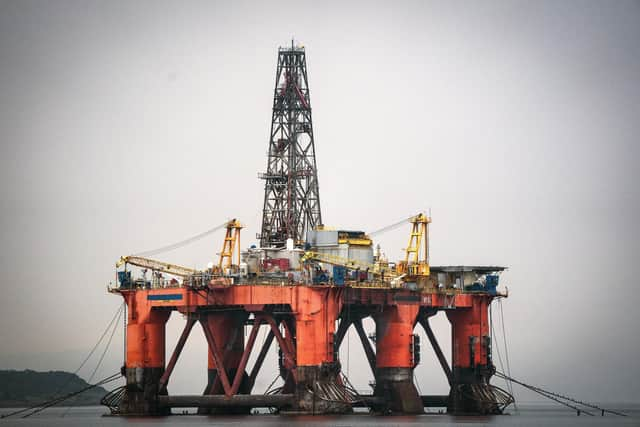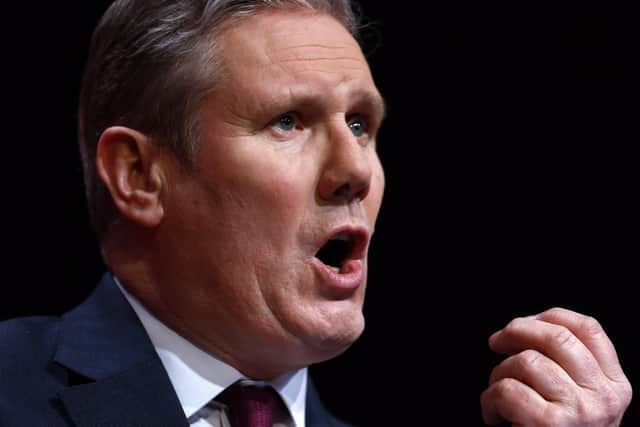Labour windfall tax: What is the windfall tax? How would it work? What impact would it have on the North Sea?
What is a windfall tax?
A windfall tax is a levy imposed by a government on companies that have benefited from something they were not responsible for – conditions they did not create.
In the case of energy firms, they have been reaping record high profits over the past few years as a result of rising demand following the lifting of Covid restrictions and then because Russia's invasion of Ukraine caused international oil and gas prices to rocket.
Advertisement
Hide AdAdvertisement
Hide AdHow does it work?
The current windfall tax – known as the Energy Profits Levy (EPL) – was first introduced by Rishi Sunak in May 2022, when he was chancellor, and applies to profits made from extracting petroleum in the UK.
It began with a 25 per cent rate, which was subsequently raised to 35 per cent from January 2023 by current chancellor Jeremy Hunt.
It is set to run until March 2028, although the government has said the tax would end if oil and gas prices fall below a certain level for six months.


This would be triggered when oil reaches $71.40 per barrel and gas reaches £0.54 per therm for two consecutive quarters.
So how much do energy firms pay?
Energy companies operating in the North Sea pay 30 per cent corporation tax on profits, plus a supplementary 10 per cent rate on top.
This is considerably more than other firms with profits over £250,000 a year, which currently pay 25 per cent corporation tax.


After adding in the windfall tax, oil and gas extractors pay a total rate of 75 per cent.
However, they are able to offset the amount of tax they pay by factoring in losses or spending on work like opening new fields and decommissioning North Sea drilling platforms at the end of their operational life.
Advertisement
Hide AdAdvertisement
Hide AdThis has meant the likes of BP and Shell had paid almost zero UK tax in the past few years.
HMRC received £2.6bn from the windfall tax in 2022-2023, the first year after it was brought in – just over half of the £5bn that was forecast.
How is Labour’s taxation proposal different?
Labour has pledged to set a “proper windfall tax” on oil and gas companies, saying that the proposals would raise £10.8 billion over five years – to be spent on green projects.
If it wins the next election, the party intends to raise the rate by three per cent, amounting to combined taxation of 78 per cent – the same as in Norway.
The EPL would also be extended by a year, to 2029.
It has said it plans to close “loopholes in the levy that funnel billions back to the oil and gas giants” by slashing investment allowances, and will ban the issuing of new North Sea drilling licences.
The Conservative government has caused controversy among environmentalists after announcing plans to dish out hundreds of new licences, despite warnings over the impact of any new production on climate change.
So what will happen to the North Sea offshore industry?
Industry leaders have already warned of fallout from the windfall tax, predicting operators will scale back UK investment or even pull out completely and focus efforts abroad.
Now Labour’s proposals have sparked a new uproar, with fears over massive job losses.
Advertisement
Hide AdAdvertisement
Hide AdA new report from investment bank Stifel estimates that the UK will lose £20 billion in tax revenues, with up to 100,000 direct and indirect jobs at risk, and a £40 billion fall in investment between now and 2030.
Aberdeen & Grampian Chamber of Commerce has described Labour’s proposals as a “betrayal” of people and companies in the north-east that “cannot be allowed to go ahead”.
Meanwhile, Offshore Energy UK, the leading representative body for the North Sea sector, has said 42,000 jobs could go.
The organisation is this week convening emergency summits with operators and suppliers to discuss the impacts of the proposals, which they say could cost 42,000 jobs.
Comments
Want to join the conversation? Please or to comment on this article.